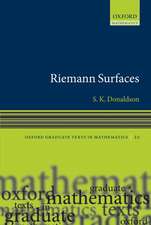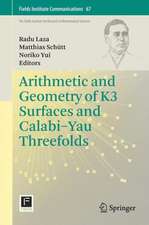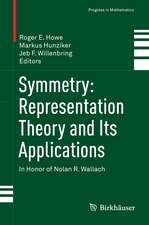Calabi-Yau Varieties: Arithmetic, Geometry and Physics: Lecture Notes on Concentrated Graduate Courses: Fields Institute Monographs, cartea 34
Editat de Radu Laza, Matthias Schütt, Noriko Yuien Limba Engleză Hardback – 30 aug 2015
The contributions in this book are based on lectures that took place during workshops with the following thematic titles: “Modular Forms Around String Theory,” “Enumerative Geometry and Calabi–Yau Varieties,” “Physics Around Mirror Symmetry,” “Hodge Theory in String Theory.” The book is ideal for graduate students and researchers learning about Calabi–Yau varieties as well as physics students and string theorists who wish to learn the mathematics behind these varieties.
| Toate formatele și edițiile | Preț | Express |
|---|---|---|
| Paperback (1) | 704.25 lei 38-44 zile | |
| Springer – 22 oct 2016 | 704.25 lei 38-44 zile | |
| Hardback (1) | 780.93 lei 38-44 zile | |
| Springer – 30 aug 2015 | 780.93 lei 38-44 zile |
Preț: 780.93 lei
Preț vechi: 1027.53 lei
-24% Nou
Puncte Express: 1171
Preț estimativ în valută:
149.45€ • 162.28$ • 125.54£
149.45€ • 162.28$ • 125.54£
Carte tipărită la comandă
Livrare economică 18-24 aprilie
Preluare comenzi: 021 569.72.76
Specificații
ISBN-13: 9781493928293
ISBN-10: 1493928295
Pagini: 547
Ilustrații: X, 547 p. 71 illus., 12 illus. in color.
Dimensiuni: 155 x 235 x 35 mm
Greutate: 1.21 kg
Ediția:1st ed. 2015
Editura: Springer
Colecția Springer
Seria Fields Institute Monographs
Locul publicării:New York, NY, United States
ISBN-10: 1493928295
Pagini: 547
Ilustrații: X, 547 p. 71 illus., 12 illus. in color.
Dimensiuni: 155 x 235 x 35 mm
Greutate: 1.21 kg
Ediția:1st ed. 2015
Editura: Springer
Colecția Springer
Seria Fields Institute Monographs
Locul publicării:New York, NY, United States
Public țintă
ResearchCuprins
The Geometry and Moduli of K3 Surfaces (A. Harder, A. Thompson).- Picard Ranks of K3 Surfaces of BHK Type (T. Kelly).- Reflexive Polytopes and Lattice-Polarized K3 Surfaces (U. Whitcher).- An Introduction to Hodge Theory (S.A. Filippini, H. Ruddat, A. Thompson).- Introduction to Nonabelian Hodge Theory (A. Garcia-Raboso, S. Rayan).- Algebraic and Arithmetic Properties of Period Maps (M. Kerr).- Mirror Symmetry in Physics (C. Quigley).- Introduction to Gromov–Witten Theory (S. Rose).- Introduction to Donaldson–Thomas and Stable Pair Invariants (M. van Garrel).- Donaldson–Thomas Invariants and Wall-Crossing Formulas (Y. Zhu).- Enumerative Aspects of the Gross–Siebert Program (M. van Garrel, D.P. Overholser, H. Ruddat).- Introduction to Modular Forms (S. Rose).- Lectures on Holomorphic Anomaly Equations (A. Kanazawa, J. Zhou).- Polynomial Structure of Topological Partition Functions (J. Zhou).- Introduction to Arithmetic Mirror Symmetry (A. Perunicic).
Textul de pe ultima copertă
This volume presents a lively introduction to the rapidly developing and vast research areas surrounding Calabi–Yau varieties and string theory. With its coverage of the various perspectives of a wide area of topics such as Hodge theory, Gross–Siebert program, moduli problems, toric approach, and arithmetic aspects, the book gives a comprehensive overview of the current streams of mathematical research in the area.
The contributions in this book are based on lectures that took place during workshops with the following thematic titles: “Modular Forms Around String Theory,” “Enumerative Geometry and Calabi–Yau Varieties,” “Physics Around Mirror Symmetry,” “Hodge Theory in String Theory.” The book is ideal for graduate students and researchers learning about Calabi–Yau varieties as well as physics students and string theorists who wish to learn the mathematics behind these varieties.
The contributions in this book are based on lectures that took place during workshops with the following thematic titles: “Modular Forms Around String Theory,” “Enumerative Geometry and Calabi–Yau Varieties,” “Physics Around Mirror Symmetry,” “Hodge Theory in String Theory.” The book is ideal for graduate students and researchers learning about Calabi–Yau varieties as well as physics students and string theorists who wish to learn the mathematics behind these varieties.
Caracteristici
Fills a gap in the existing literature, presenting a friendly yet comprehensive introduction of the subject matter Covers diverse streams of current research Provides quick exposure to rapidly developing subjects


























